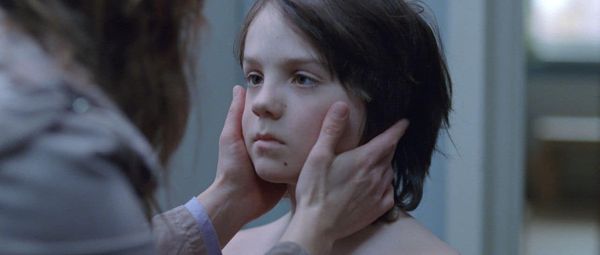Eye For Film >> Movies >> Babycall (2011) Film Review
Babycall
Reviewed by: Jennie Kermode

A mother and son move into an apartment building. The son is withdrawn, resentful; the mother worries that he'll fall if he runs, get hit by a car if he crosses the road, catch a cold if he takes off his jacket. It's understandable that she would feel protective. Her husband was violent to both of them. Trying to cope a little better without suffocating her son, she buys a Babycall monitor so she can hear him when he's sleeping. But the monitor seems to pick up a signal from somewhere else in the building. Through it, she hears what sounds like an abused child screaming for help.
It can easily be argued that Noomi Rapace keeps on appearing in different takes on the same story. Like Daisy Diamond, the Millennium trilogy and Beyond, this is a tale played out under the shadow of male violence toward women, with a damaged and possibly abusive mother figure, a vulnerable child and a heroine who may not quite be sane. Like those films, it hinges on a devastating performance from Rapace, who fully inhabits her character and does create somebody different from the previous versions. She is, of course, far from the first creative artist to work this way (though few have been female), and there's a great deal to explore within these themes, especially as they are underexplored in film more generally.

Babycall's Anna is the most interesting of her characters to date. The film is tighter, darker, noirish. It quickly becomes apparent that Anna's brokenness means we cannot take for granted the things she perceives. Like Rear Window if James Stewart's character had doubted himself, the film becomes a tangle of paranoid possibilities. It isn't altogether successful at navigating these. You may need to watch it a couple of times to be sure you've understood everything, and even then some of the pieces don't quite fit. But whilst this may feel unsatisfying to audiences used to more mainstream work, it fits within the Gothic tradition, forcing viewers to ask deeper questions.
Babycall also serves as a meta-analysis of Rapace's other work, asking questions about what paranoia, anger and fear do to a person and to those around them. The inevitable tension in a story like this usually makes viewers wish the protagonist would be more cautious, better prepared. In that regard, we can feel safe with Anna as we might with Ripley among Aliens, but like Ripley, she's an uneasy person to be close to, perhaps too similar to the monster herself. When fear itself represents a threat, the pressure is really on.
Rapace's performance in this film won her the Best Actress award at the Rome International Film Festival. It is compelling to watch, and the film's haunting atmosphere will stay with you for a long time after the credits roll.
Reviewed on: 04 Feb 2012
















